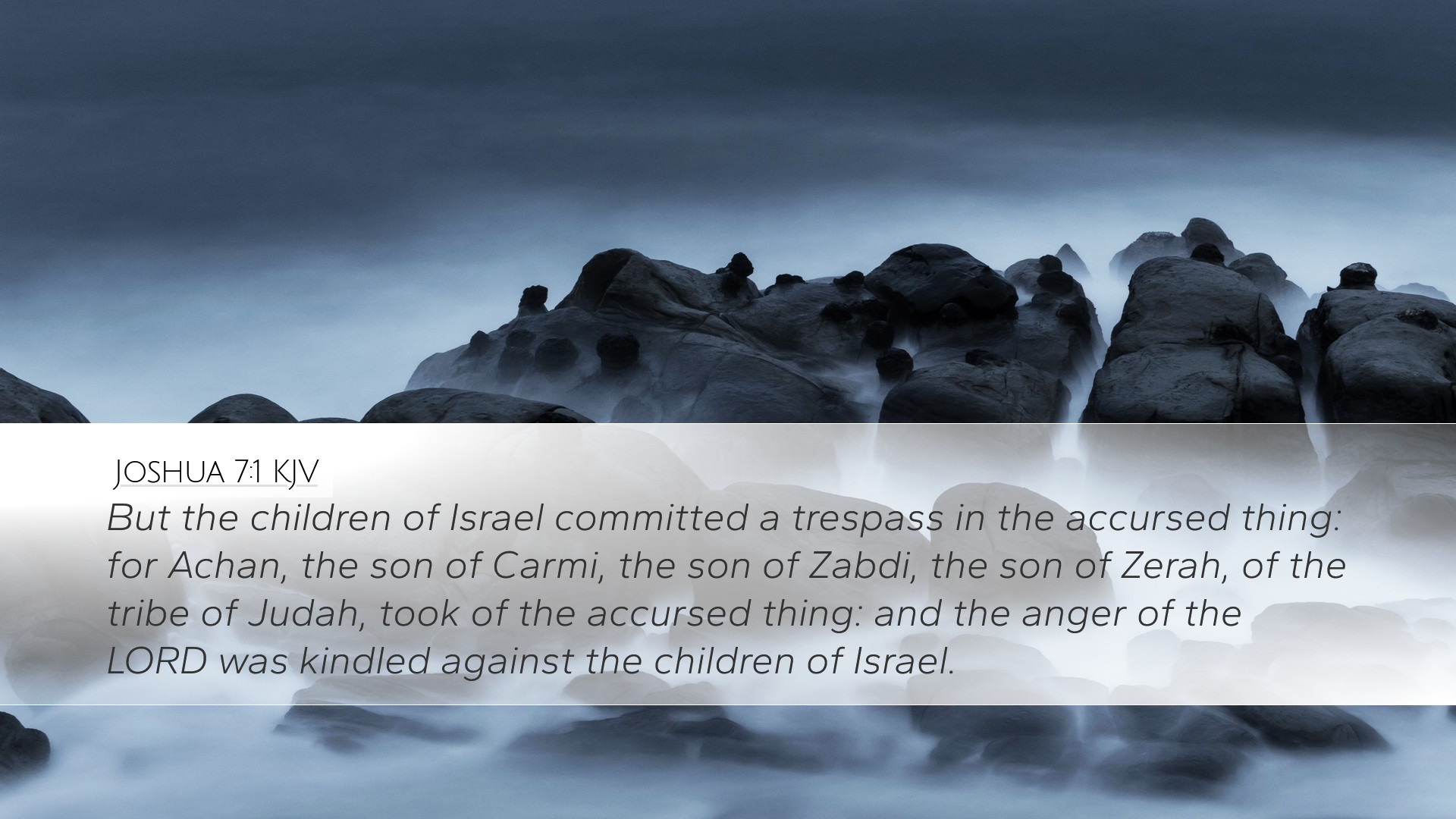Commentary on Joshua 7:1
Text of Joshua 7:1 (ESV): "But the people of Israel broke faith in regard to the devoted things, for Achan the son of Carmi, son of Zimri, son of Zabdi, of the tribe of Judah, took some of the devoted things. And the anger of the LORD burned against the people of Israel."
Introduction
This verse marks a significant turn in the narrative of the Israelite conquest of Canaan. After a victorious campaign at Jericho, Israel faces an unexpected defeat at Ai due to the sin of one man, Achan. This passage serves as a solemn reminder of the communal impact of individual sin and highlights God's holiness and the necessity of obedience in the covenant relationship.
Analysis of Key Elements
The Broken Faith
Matthew Henry comments that the phrase "broke faith" indicates a serious breach of trust between the Israelites and God. This breach is not just personal but has corporate ramifications, affecting the entire community of Israel, as they are all liable to the consequences of Achan's actions.
The Devoted Things
The "devoted things" refers specifically to items that were set apart for destruction or for the treasury of the Lord as a means of executing divine judgement against the Canaanites. Albert Barnes emphasizes the gravity of Achan's sin in taking these items, as it violated the explicit command of God, thus provoking His anger against all Israel.
Achan’s Identity
Adam Clarke elaborates on Achan's genealogy, observing that he is described as the "son of Carmi," leading to reflections on the responsibilities of family lineage. His identity rooted in the tribe of Judah adds to the tragedy, considering Judah’s prominent role in the history of Israel and in the lineage of Christ. This act of sin is a stark contrast to the honor associated with his tribe.
Theological Implications
The Nature of Sin
This verse encapsulates the pervasive nature of sin. It reveals how one individual's failure to obey God can lead to collective consequences. Henry reflects on the shocking reality that one man's act of rebellion can incite divine wrath upon an entire community, challenging the notion of individualism in the faith context.
God’s Holiness
Barnes notes that God's anger "burned against the people of Israel" signifies the seriousness with which He regards holiness and purity among His people. The violation of divine commands demands judgment, underscoring the theme of God’s holiness throughout Scripture. The community’s wellbeing relies on obedience to God’s commands.
Corporate Responsibility
This incident illustrates the principle of corporate responsibility within the community of faith. Clarke points out that Israel’s collective guilt serves as a warning that believers must not only guard their own conduct but also hold one another accountable, for the actions of one can lead to judgment upon the whole community.
Practical Applications
Accountability in the Church
The narrative of Achan calls for a culture of accountability within the church. Believers are to encourage one another in faithfulness to God's commands. Henry suggests that churches can learn from this story, emphasizing the need for vigilant leadership and the proactive addressing of sin among members.
The Importance of Obedience
This passage serves as a wake-up call regarding the necessity of complete and uncompromising obedience to God’s word. Barnes reminds us that partial obedience is not obedience at all. Pastors and leaders are encouraged to communicate the importance of following God’s instructions fully to the congregations they serve.
Encouragement for Spiritual Vigilance
Lastly, Joshua 7:1 encourages prayerful vigilance against sin in one's own life and the life of the community. Clarke warns against complacency, urging believers to be ever aware of the spiritual battle that surrounds them and to diligently seek God’s guidance and grace to resist temptation.
Conclusion
Joshua 7:1 not only narrates a historical event in Israel’s history but conveys profound theological truths about sin, accountability, and God's holiness. For pastors, students, theologians, and Bible scholars, this verse provokes critical reflection on the serious implications of disobedience and the importance of maintaining integrity within the community of faith.


